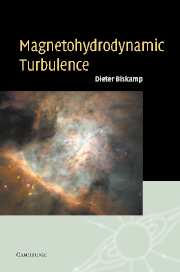Book contents
- Frontmatter
- Contents
- Preface
- 1 Introduction
- 2 Magnetohydrodynamics
- 3 Transition to turbulence
- 4 Macroscopic turbulence theory
- 5 Spectral properties and phenomenology
- 6 Two-point-closure theory
- 7 Intermittency
- 8 Two-dimensional turbulence
- 9 Compressible turbulence and turbulent convection
- 10 Turbulence in the solar wind
- 11 Turbulence in accretion disks
- 12 Interstellar turbulence
- Outlook
- References
- Index
11 - Turbulence in accretion disks
Published online by Cambridge University Press: 17 August 2009
- Frontmatter
- Contents
- Preface
- 1 Introduction
- 2 Magnetohydrodynamics
- 3 Transition to turbulence
- 4 Macroscopic turbulence theory
- 5 Spectral properties and phenomenology
- 6 Two-point-closure theory
- 7 Intermittency
- 8 Two-dimensional turbulence
- 9 Compressible turbulence and turbulent convection
- 10 Turbulence in the solar wind
- 11 Turbulence in accretion disks
- 12 Interstellar turbulence
- Outlook
- References
- Index
Summary
In this chapter we talk about accretion disks, a widespread phenomenon in astrophysics, wherein magnetic turbulence is present not just as a byproduct but rather is essential for its very existence, as is now generally believed. Accretion, the accumulation of mass onto a central object due to gravitational attraction, naturally leads to the formation of disk-like structures, since the infalling matter, due to conservation of angular momentum, tends to rotate about the center of gravity. The system is in approximate equilibrium, in that the radial component of the gravitational force is balanced by the centrifugal force and the axial component by the pressure gradient. Since the disk material moves on Keplerian orbits with angular velocity Ω(r) α r−3/2, the angular momentum α r2Ω decreases with decreasing radius. Hence, when the matter moves inward, conservation of angular momentum requires that the excess is transferred outward. Thus the rate of accretion of mass is determined by the transport of angular momentum, which therefore becomes the crucial issue for understanding the dynamics of these systems. If a transport mechanism is provided, material is spiraling in toward the central object (just as conservation of vorticity leads to a spiraling flow of the water from a bathtub).
Information
- Type
- Chapter
- Information
- Magnetohydrodynamic Turbulence , pp. 233 - 255Publisher: Cambridge University PressPrint publication year: 2003
